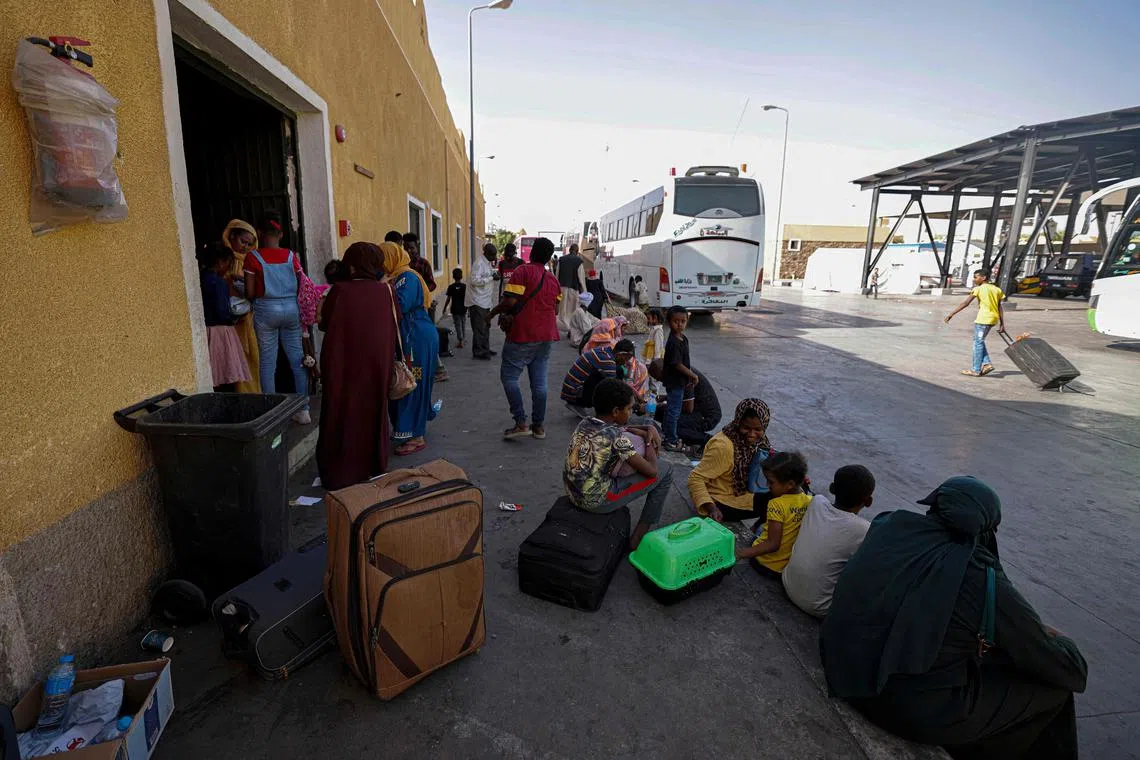Khartoum region under bombardment as Sudan’s rival factions talk
Sign up now: Get ST's newsletters delivered to your inbox

People fleeing the conflict in Sudan arriving at the Qastal Lan Port crossing between Egypt and Sudan on May 13.
PHOTO: AFP
KHARTOUM – Shelling and air strikes pounded parts of Sudan’s capital on Sunday, with little sign that warring military factions were ready to back down in a conflict that has killed hundreds despite ceasefire talks in Saudi Arabia.
Khartoum and the adjoining cities of Bahri and Omdurman across the Nile’s two branches have been the main theatre of conflict, along with western Darfur province, since the army and the paramilitary Rapid Support Forces (RSF) started fighting a month ago.
Shelling struck Bahri and air strikes hit Omdurman early on Sunday, according to a Reuters reporter and witnesses. Al Arabiya television reported heavy clashes in central Khartoum.
“There were heavy air strikes near us in Saliha that shook the doors of the house,” said Ms Salma Yassin, a teacher in Omdurman.
The conflict
The number of people killed in fighting on Friday and Saturday in Geneina, capital of West Darfur, reached more than 100, including the imam of the city’s old mosque, the Darfur Bar Association said in a statement.
The local rights group blamed the killings, looting and arson in Geneina, where hundreds died in violence in April, on attacks by armed groups on motorcycles and the RSF. The RSF has denied responsibility for the unrest.
Army chief Abdel Fattah al-Burhan and RSF leader Mohamed Hamdan Dagalo, known as Hemedti, had shared power after a 2021 coup, which itself followed a 2019 uprising that ousted veteran Islamist autocrat Omar al-Bashir.
But the two fell out over the terms and timing of a planned transition to civilian rule and neither man has shown he is ready for concessions, with the army controlling air power and the RSF dug deep into city districts.
Truce deals have been repeatedly broken, but the United States and Saudi Arabia are mediating talks in Jeddah aimed at securing a lasting ceasefire.
“You don’t know how long this war will continue... The house became unsafe and we don’t have enough money to travel out of Khartoum. Why are we paying the price of Burhan and Hemedti’s war?” said Ms Yassin, the teacher.
For civilians, the conflict has unleashed a nightmare of bombardment, random gunfire, home invasions and looting, amid flickering electricity supply, shortages of water and food, and little chance of medical help with injuries.
“Our neighbourhood is now completely under RSF control. They loot and harass people and wander around, always armed, taking shelter wherever they want,” said Ms Duaa Tariq, 30, an art curator in Khartoum.
She hopes the talks in Jeddah can lead to a ceasefire but is doubtful, adding: “We can’t really trust either side because they don’t have control of their soldiers on the ground”.
Medical charity Medicins Sans Frontieres said displaced people living in a large camp in north Darfur were cutting down to a single meal a day because food aid programmes had been halted by fighting. It added that the condition of already malnourished children would likely deteriorate.
Airspace will stay closed, except for aid flights, until May 31, the authorities said on Saturday.
On Thursday, the sides agreed on a “declaration of principles” to protect civilians and secure humanitarian access, but with Sunday’s discussions due to address monitoring and enforcement mechanisms for that deal, the fighting has not let up. REUTERS


